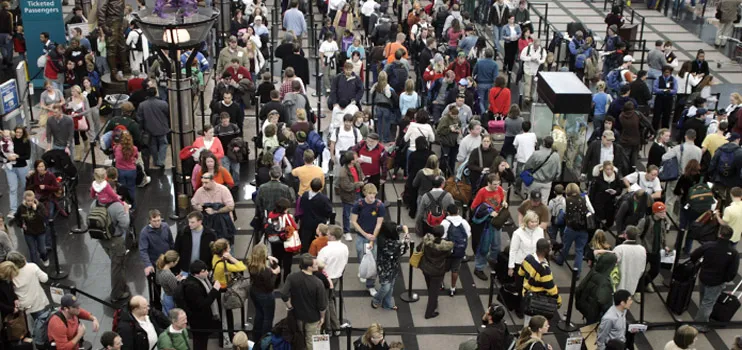
Passengers, sick of queuing, demand more control
Oct 16, 2019

Passengers increasingly express frustration over long queues at airports and train stations, leading to a growing demand for greater control over their travel experiences. Many travelers seek solutions that allow them to bypass traditional check-in lines and security checks, favoring self-service options that streamline the process. The desire for efficiency has prompted innovations such as mobile check-ins, automated kiosks, and enhanced digital services. As travelers prioritize convenience and time savings, transportation providers are urged to adapt and implement more user-friendly systems that cater to this shift in expectations, ultimately enhancing the overall journey for passengers.
Understanding Passenger Frustrations
In recent years, air travel has seen a significant increase in the number of passengers. While this surge has brought about more options for destinations and fares, it has also led to longer queues and increased wait times at airports. Passengers are becoming increasingly vocal about their frustrations, demanding more control over their travel experiences. The need for efficient services and solutions that can alleviate the burden of queuing has never been more apparent.
The Demand for Control
Passengers are no longer satisfied with merely being passive participants in their travel experiences. They are calling for more control over various aspects of their journeys, including check-in processes, security protocols, and boarding procedures. With advancements in technology, travelers expect airlines and airports to adopt innovative solutions that minimize waiting times and enhance overall efficiency.
Innovative Solutions to Alleviate Queues
There are several innovative solutions that airlines and airports can implement to tackle the issue of queuing:
| Solution | Description |
|---|---|
| Mobile Check-In | Allowing passengers to check in via mobile apps reduces the need to queue at check-in counters. |
| Self-Service Kiosks | These kiosks enable travelers to print boarding passes and baggage tags, expediting the check-in process. |
| Biometric Screening | Using facial recognition technology can speed up security checks, allowing for a smoother boarding experience. |
| Real-Time Updates | Providing real-time information about flight statuses and gate changes can help passengers manage their time better. |
Passenger-Centric Approaches
Airlines and airports must adopt a passenger-centric approach to address these demands effectively. Understanding the needs and preferences of travelers is crucial. Here are a few strategies that can help improve passenger satisfaction:
- Personalized Communication: Tailoring messages based on passenger profiles can enhance their travel experience.
- Flexible Policies: Implementing more flexible ticket policies can alleviate stress for travelers who face unexpected changes.
- Feedback Mechanisms: Establishing channels for passengers to voice their concerns and suggestions can foster a sense of involvement and commitment to improvement.
Technology as a Key Enabler
Technology plays a vital role in transforming the air travel experience. With the integration of advanced systems, airlines can streamline operations and enhance passenger control. Here are some technological advancements that are making waves in the industry:
| Technology | Impact |
|---|---|
| AI-Powered Chatbots | Chatbots provide instant responses to passenger inquiries, reducing the need for them to queue for assistance. |
| Mobile Notifications | Push notifications about delays, gate changes, and other important updates keep passengers informed and prepared. |
| Contactless Payments | Enabling contactless payment options minimizes physical interactions, making transactions quicker and safer. |
| Smart Baggage Tracking | Passengers can track their luggage in real-time, reducing anxiety and the need to queue at lost baggage counters. |
Airlines Responding to Passenger Demands
In response to these growing demands, several airlines have begun to implement changes aimed at improving the overall travel experience. For instance, some airlines are introducing priority boarding options that allow passengers to skip queues, while others are optimizing their staffing during peak times to ensure that queues move swiftly.
As passengers continue to express their dissatisfaction with long wait times, it is evident that a shift in how airlines operate is necessary. By embracing technology and enhancing customer service, airlines can foster a more positive travel experience.
The Future of Air Travel
The air travel industry is at a pivotal moment, where passenger expectations are evolving rapidly. With the demand for more control and efficient services on the rise, airlines and airports must adapt to these changes to stay competitive. The integration of technology, combined with a focus on passenger needs, will be essential in shaping the future of air travel.
Conclusion
As passengers grow increasingly frustrated with queuing and lengthy wait times, their demand for more control over their travel experiences will only intensify. It is crucial for airlines and airports to listen to these concerns and implement innovative solutions that prioritize passenger satisfaction. By embracing technology and adopting a customer-centric approach, the air travel industry can provide a seamless experience that meets the evolving expectations of modern travelers.
Related Articles

Explore Thailand: The Best Islands to Visit for Paradise, Adventure, and Relaxation

The Ultimate Guide to the Best Islands in Thailand for Your Next Getaway

Do babies need passports? How to get a passport for a newborn

How to get a U.S. passport fast: here’s how to expedite the process

What is Mobile Passport Control: 5 reasons why you should use it

SENTRI vs. Global Entry: A detailed guide

Do you need a passport to go to the Bahamas? Let’s find out

Do you need a passport to go to Mexico? A detailed guide

Do you need a passport to go to Canada? We got the answer

Do You Need a Passport for a Cruise: An Essential Travel Guide

Booster Seat Requirements: All the Rules to Follow in Your Rental Car

What Are the World’s Most Powerful Passports, and How Does Yours Rank?

How to Take a Passport Photo at Home: A Helpful Guide

You've got to have heart! Southwest's new livery

Your opinion: Should water be free on low cost carriers?

Young women bolder than guys as solo travellers
